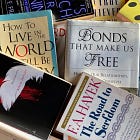It's What You Do Next that Counts
Seeing that we get trapped by the small stuff is meaningless without action.
As she was dying of cancer at age 35, Bailey Jean Matheson touched people all over the world by writing her obituary. Matheson expressed gratitude for her loving family and friends and her beautiful but short life. She closed her obituary with this advice: “Don’t take the small stuff so seriously and live a little.”
Bailey’s story will transform a few, but what about the rest of us? Our resolve to approach the world with a lighter touch may carry us for a few days. Then, the gravity of old entrenched mindsets takes hold, and we return to sweating the small stuff. Inspiration seems to have a short half-life.
Since inspiration has a short half-life, we don’t need to be unrealistic and expect that one day, inspiration will replace effort. Psychologist David K. Reynolds (we will work with his ideas on Constructive Living in 2025 in Mindset Shifts U) wrote: “There is no moral credit accruing to insight. One is not a better human being for deeply understanding or sternly evaluating oneself.”
Seeing that we get trapped in small stuff is meaningless without action. Reynolds explains: “No one masters emotions. No one needs to do so… It's what you do next that counts. Reality requires your best service.”
Fortunately, greater awareness of our mindset allows us to make progress towards reducing the bandwidth we give to small stuff. The work of Nobel laureate in economics, Daniel Kahneman, helps us see how we undermine our well-being by making poor decisions as we sweat the small stuff.
We can sweat the small stuff, realize what we are up to, and still do what needs to be done. Our focus on the small stuff diminishes as we do what needs to be done. Our failure to realize what we are up to trips us up.
During my daily walk, I gain at least 400 ft of elevation. Some days, I don’t feel like it. My thinking is noisy. I may be tired. On a humid summer day, mosquitos may be out. On a windy winter day, it feels bitterly cold. Nevertheless, my feet keep moving, and then the noise stops. As the noise stops, the winter wind stops, too. Of course, the wind hasn’t really stopped, but my focus has changed.
Kahneman, in his book Thinking, Fast and Slow, explains the mindset that grips us when we give our dysfunctional thinking such relevance. Kahneman points us to the focusing illusion: “Nothing in life is as important as you think it is while you are thinking about it.”
How is your life going? “Any aspect of life to which attention is directed will loom large in a global evaluation,” writes Kahneman.
In our search for happiness, we often focus on the small stuff because we think we need more of this and less of that. The research is clear: hedonic changes—a new car, a new house, etc.—in our life do little to increase happiness. Kahneman observes, “even permanent life circumstances have little effect on well-being.”
Kahneman observes we will exaggerate “the effect of significant purchases or changed circumstances on our future well-being.” Better to practice the cello or improve your coding skills than researching the features of the newest iPad. “The focusing illusion creates a bias in favor of goods and experiences that are initially exciting, even if they will eventually lose their appeal,” writes Kahneman. After you experience the wonders of the latest iPad, you may find it nice but really not that important.
When Kahneman studied college students in California, Ohio, and Michigan, he found, not surprisingly, that “Californians enjoyed their climate and the Midwesterners despised theirs.” Yet “there was no difference whatsoever in the life satisfaction of students in California and in the Midwest.” Due to the focusing illusion, “All suffered an exaggerated belief in the importance of climate.”
Unaware that you are caught in a focusing illusion, your thoughts can multiply faster than rabbits; and soon, you have no mental bandwidth left to get on with your day. When your day seems like a tedious slog, you might be certain that other people and circumstances are causing your feelings of angst and oppression. You might think everyone, except yourself, has to change. You might demand that social and political views different than your own be silenced. Beware, you are your own enslaver.
Our minds work against us in another critical way. Kahneman reports on research pointing to a negativity bias in humans. Simply, “bad information is processed more thoroughly than good.”
The combination of negativity bias and the focusing illusion can send us into an endless loop of worry and anxiety. We apply laser focus to thinking that has little or no significance. Miserable days stack up when we don’t understand how our thinking can work against us.
We can’t change a mindset we’re not aware of. As you become more aware, you may be surprised by the number of thought storms you experience daily. Since these storms are coming from you and not from the world, the only change possible is your willingness to have less tolerance for your grievances and thoughts of misery. Just because thoughts come to mind doesn’t mean they are worth your attention.
If you forget you are wearing dark sunglasses at 6 p.m. on a summer day, you might believe the time is closer to 9 p.m. You can remove your sunglasses or remind yourself that the glasses give you false information. Awareness is a powerful cure.
If we want to increase our well-being, Kahneman’s work points us in a helpful direction. The more we are aware of what we focus our thinking on, the more attention we can place on what we choose to experience. Instead of being trapped in thoughts about the small stuff, we have more capacity to experience life.
With awareness, we can watch our thoughts drift to the past or the future. We notice how often we insist on carrying around grievances. Thoughts of an argument that happened last week are merely a memory we recreate via thinking this moment. When our thinking drifts to the past or future, simply noticing the drift can bring us back to the present. Being present, in a state of flow, vanquishes the small stuff.
Kahneman observes, “We all care intensely for the narrative of our own life and very much want it to be a good story, with a decent hero.”
The “decent hero” doesn’t emerge by allowing mental illusions to squander time.
When you catch yourself making a big deal over the small stuff, imagine a part of you is sitting in the audience, watching yourself act out on the stage. Hear yourself utter your tired grievances. Consider the trouble your grievances create for others. Then, smile and say, “Here I go again.”
Who is witnessing your antics? By asking that question, you have restored the power of choice to your mind. Your latest thought, as my UK friends might say, is probably rubbish and can safely be ignored. You are not that discordant, brash, incessant voice in your head demanding you pay attention to the small stuff.
When we sweat the small stuff, we are actively choosing against the best version of ourselves. We might find ourselves blaming society for the miserable choices we have made. We might be surprised by what is possible when we free up our mental bandwidth. As Reynolds admonishes: “Know this clearly—for all your insight, you are what you do.”
Portions of this essay were originally published at the Foundation for Economic Education.
Our study of The Road to Serfdom begins next Saturday. If you would like to benefit from the insights of Hayek, Seneca, and Reynolds, become a paid subscriber today. You will also receive immediate access to the archives of Mindset Shifts U.






Some many great nuggets in this essay - love the sunglasses comment about adjusting your “view” and the sitting in the audience to watch your silly reaction to something so small - thanks Barry!
“Inspiration seems to have a short half life”. How true for me. Friend of mine would say “ always was a will be”. Best advice for the times. Thanks Prof. B.